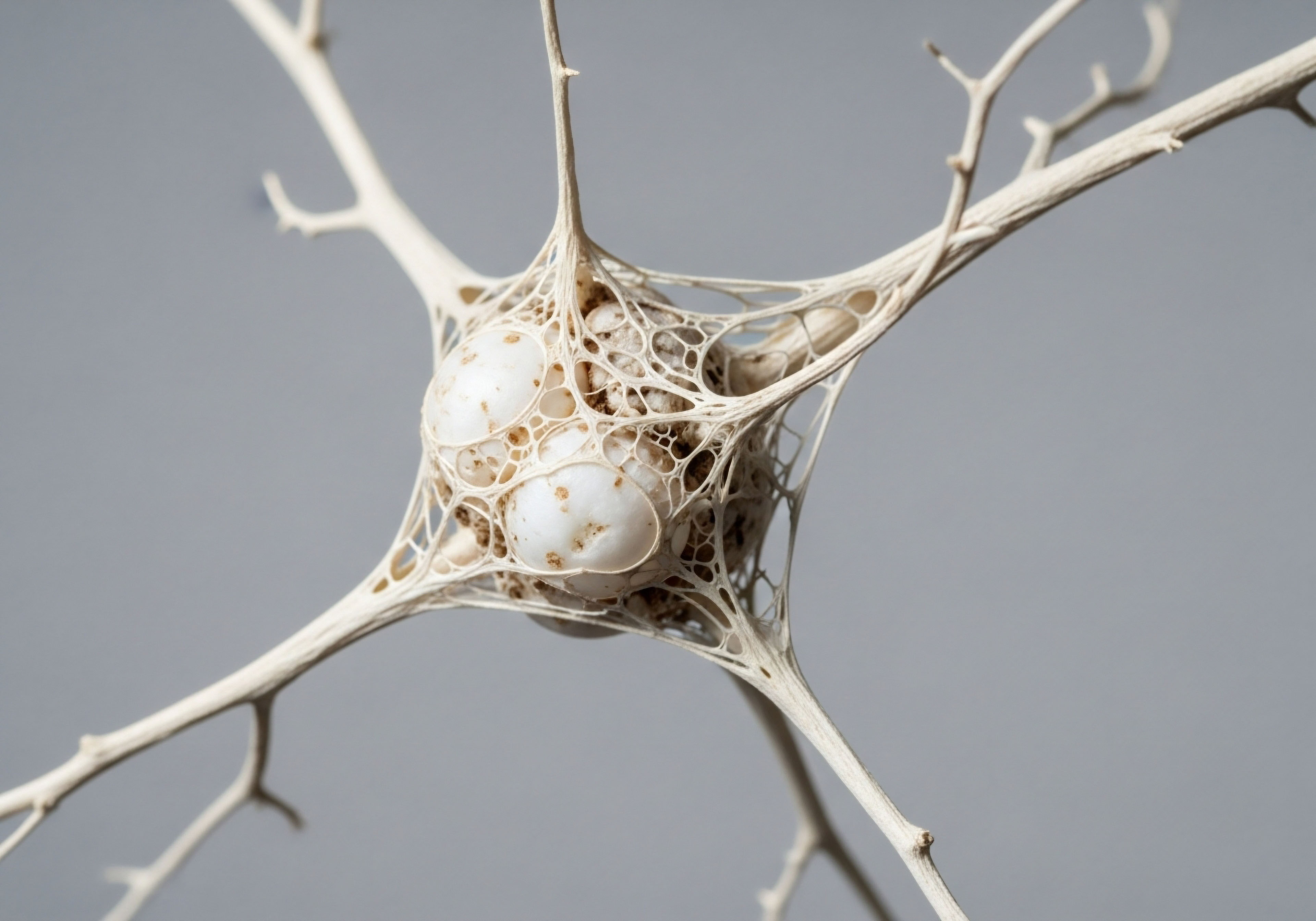

Understanding Your Biological Blueprint
Many individuals seeking to reclaim their vitality often find themselves navigating a complex landscape of symptoms ∞ persistent fatigue, recalcitrant weight gain, shifts in mood, or a diminishing sense of inner equilibrium. These experiences, while deeply personal, frequently signal an underlying dysregulation within the body’s intricate internal communication systems, particularly the endocrine system.
The journey toward optimal health begins with an understanding of these foundational biological processes, recognizing that each person possesses a unique biological blueprint. This blueprint, etched within our genetic code, influences how our hormones function, how our metabolism processes nutrients, and how our bodies respond to environmental cues.
Your personal health journey begins with deciphering your unique biological blueprint, particularly its influence on hormonal and metabolic harmony.
Genetic data, when viewed through a clinical lens, offers a powerful instrument for discerning individual predispositions and tailoring wellness protocols with precision. This information, however, carries an inherent sensitivity. The decision to share such intimate biological details, particularly when incentives are present, warrants careful consideration. These incentives, ranging from financial benefits to access to specialized programs, can subtly influence individual choices, creating a dynamic where the perceived value of a reward might overshadow a complete understanding of data implications.
Personal genetic information, encompassing details about our inherited traits and predispositions, forms a cornerstone of personalized wellness. Wellness programs frequently propose sharing this data to offer bespoke dietary recommendations, exercise regimens, or even insights into hormonal health. While the promise of hyper-personalized guidance is compelling, the mechanisms by which this data is collected, stored, and utilized demand transparent scrutiny. Ensuring individual autonomy over these deeply personal insights remains paramount.

The Intricacies of Genetic Data and Personal Autonomy
Our genetic makeup dictates a multitude of biological responses, from how efficiently our thyroid functions to the precise mechanisms governing insulin sensitivity. Sharing this information allows wellness programs to construct highly individualized profiles. However, the very act of sharing introduces questions about data ownership and control. Once genetic data leaves an individual’s direct possession, its subsequent use can become opaque, particularly when third-party entities gain access.
- Data Ownership ∞ Individuals retain ultimate rights over their genetic information.
- Consent Clarity ∞ Informed consent requires a comprehensive understanding of all potential data uses.
- Data Security ∞ Robust measures protect sensitive genetic information from unauthorized access.
The landscape of genetic data sharing within wellness programs presents a complex interplay between individual aspiration for improved health and the broader implications of data management. A comprehensive understanding of these dynamics empowers individuals to make choices that align with their personal values and long-term well-being.


Navigating Data Sharing in Personalized Wellness
For those who have already begun to understand the foundational principles of their endocrine system and metabolic health, the discussion surrounding genetic data sharing progresses to a more intricate plane. Here, we consider the specific clinical protocols that genetic insights might inform, such as targeted hormonal optimization strategies or metabolic recalibration.
The utility of genetic data becomes apparent when considering pharmacogenomics, which predicts an individual’s response to certain medications, including components of hormonal optimization protocols. For instance, genetic variations can influence how a person metabolizes testosterone cypionate or responds to estrogen modulators.
Genetic insights enhance the precision of hormonal and metabolic protocols, yet their sharing requires careful evaluation of potential influences.

Incentive Structures and Informed Consent
Wellness programs often employ incentives to encourage participation and data sharing. These incentives can range from reduced insurance premiums to access to exclusive health coaching. While seemingly benign, such inducements can create a subtle pressure, potentially compromising the truly voluntary nature of consent.
An individual, particularly when facing financial benefits, might feel compelled to share genetic information without fully appreciating the long-term implications for privacy or potential discrimination. The distinction between truly voluntary participation and participation influenced by significant incentives holds considerable weight.
Genetic information, unlike other forms of personal data, possesses a unique permanence and familial relevance. A genetic predisposition for a specific metabolic condition, for example, not only pertains to the individual but also carries implications for biological relatives. This interconnectedness elevates the ethical stakes surrounding data sharing. The potential for re-identification, even from supposedly anonymized datasets, remains a persistent concern. Sophisticated algorithms can reconstruct individual identities from seemingly disparate data points, a reality that necessitates robust data governance frameworks.

Pharmacogenomic Insights and Hormonal Protocols
Consider the application of genetic data in guiding hormonal optimization. For men undergoing testosterone replacement therapy (TRT), genetic variations influence the rate of testosterone conversion to estrogen, impacting the necessary dosage of anastrozole. Similarly, in women receiving testosterone cypionate or progesterone, genetic markers can predict individual metabolic pathways, guiding precise dosing to achieve optimal endocrine balance. Wellness programs leveraging these insights offer a pathway to truly personalized care.
The table below illustrates how genetic data can inform specific hormonal protocols, highlighting the types of genetic insights that contribute to precision medicine in this realm.
| Hormonal Protocol | Relevant Genetic Insight | Clinical Application |
|---|---|---|
| Testosterone Replacement Therapy (Men) | CYP19A1 gene variants (aromatase activity) | Adjusting Anastrozole dosage to manage estrogen conversion. |
| Testosterone Replacement Therapy (Women) | Androgen receptor sensitivity gene variants | Tailoring testosterone dosage for optimal response and symptom resolution. |
| Progesterone Therapy (Women) | CYP21A2 gene variants (progesterone metabolism) | Personalizing progesterone dosing for improved efficacy and reduced side effects. |
| Growth Hormone Peptide Therapy | GH receptor gene variants | Optimizing peptide selection and dosage for enhanced growth hormone response. |
Understanding the ‘how’ and ‘why’ of genetic data utilization in these contexts enables a more discerning approach to wellness program participation. It empowers individuals to weigh the benefits of personalized protocols against the enduring implications of sharing their unique biological code.


Advanced Bioethical Frameworks for Genetic Data Stewardship
The discourse surrounding incentivized genetic data sharing in wellness programs ascends to its most complex strata when examined through advanced bioethical frameworks and a systems-biology perspective. Here, the focus shifts from individual transactions to the broader societal implications and the intricate molecular underpinnings of genetic influence on the endocrine system.
The profound value of genomic information, particularly its capacity to reveal predispositions to metabolic dysfunction or modulate hormonal axes, necessitates a rigorous ethical posture. This includes a deep consideration of the HPG (Hypothalamic-Pituitary-Gonadal) axis, where genetic polymorphisms can influence receptor sensitivity, enzyme activity, and feedback loop efficacy, thereby shaping an individual’s entire endocrine milieu.

The Interconnectedness of Genetic Predisposition and Endocrine Function
Genetic variations directly influence the synthesis, transport, and receptor binding of hormones. For example, specific single nucleotide polymorphisms (SNPs) within genes encoding steroidogenic enzymes can alter the efficiency of testosterone or estrogen production. Similarly, variations in genes affecting thyroid hormone receptors or insulin signaling pathways profoundly impact metabolic homeostasis.
When individuals share genetic data, they reveal these deeply embedded biological mechanisms. Incentivizing this disclosure introduces a potential for commercial exploitation of these fundamental biological insights, where proprietary algorithms might leverage this data for profit, sometimes at the expense of individual data sovereignty.
Genetic data sharing in wellness programs demands advanced ethical scrutiny, particularly concerning its influence on endocrine and metabolic pathways.
The concept of “genetic surveillance” gains particular salience in this context. Widespread incentivized genetic testing can normalize the collection of highly sensitive biological identifiers, fostering an environment where relinquishing genomic privacy becomes a societal expectation for accessing health benefits. This trajectory risks exacerbating existing health disparities, as programs often target specific demographics, leaving others underserved or disproportionately burdened by data sharing expectations. The long-term societal impact of such normalization warrants careful, longitudinal study.

Ethical Safeguards and Data Integrity
Establishing robust ethical safeguards for incentivized genetic data sharing involves a multi-pronged approach. Comprehensive consent processes must move beyond mere legalistic checkboxes, truly educating individuals about the scope of data use, the permanence of genetic information, and the limitations of anonymization. The re-identification of de-identified genetic datasets, even with advanced cryptographic techniques, remains a theoretical and sometimes practical possibility, underscoring the enduring vulnerability of this information.
The Genomic Information Nondiscrimination Act (GINA) provides some protection against discrimination in employment and health insurance based on genetic information. However, GINA’s scope contains limitations; it does not extend to life insurance, disability insurance, or long-term care insurance. This gap creates a substantial risk for individuals who share their genetic data, particularly when those data reveal predispositions to chronic conditions or early-onset diseases that might influence future insurability.
A rigorous analytical framework for evaluating these programs must integrate principles from bioethics, public health, and data science. This involves ∞
- Transparency in Data Flow ∞ Mapping the complete lifecycle of genetic data, from collection to storage, processing, sharing with third parties, and eventual destruction.
- Auditable Consent Mechanisms ∞ Implementing systems that allow individuals to track and revoke consent for specific uses of their genetic data at any point.
- Independent Oversight ∞ Establishing independent ethical review boards, distinct from the wellness program providers, to scrutinize data sharing practices and incentive structures.
- Equity in Access and Protection ∞ Ensuring that the benefits of personalized wellness, and the protections for genetic data, are equitably distributed across all socioeconomic and demographic groups.
The profound potential of genetic insights for optimizing endocrine health and metabolic function stands undeniable. However, the ethical landscape surrounding incentivized genetic data sharing demands a commensurate level of scrutiny and a commitment to protecting individual autonomy and societal well-being.

Can Incentivized Genetic Data Sharing Compromise Patient Trust?
The bedrock of any effective clinical relationship rests upon trust. When wellness programs offer incentives for sharing genetic data, they introduce a commercial dimension that can erode this trust. Patients may perceive that their deeply personal biological information is being commodified, potentially leading to a reluctance to fully engage with personalized wellness recommendations, even when those recommendations are scientifically sound.
A sustained relationship between an individual and their health provider requires an environment free from perceived coercion or commercial influence over sensitive data.

References
- Schmidt, A. J. (2024). Ethical Challenges in Genetic Research ∞ Navigating Privacy, Consent, and Equity. Journal of Research and Reports in Genetics, 6(5), 230.
- Wolfe, J. (2018). Coerced into Health ∞ Workplace Wellness Programs and Their Threat to Genetic Privacy. Minnesota Law Review, 103(1), 373-406.
- Mittelstadt, B. D. & Floridi, L. (2016). The Ethics of Big Data ∞ Current Challenges and Future Directions. Science and Engineering Ethics, 22(3), 679-703.
- Sankar, P. (2003). Informing Technology Policy Decisions ∞ The US Human Genome Project’s Ethical, Legal, and Social Implications Programs as a Critical Case. Technology in Society, 24(1-2), 111-132.
- McGuire, A. L. & Burke, W. (2008). An Unwelcome Side Effect of Direct-to-Consumer Personal Genome Testing ∞ Raiding the Medical Commons. Journal of the American Medical Association, 300(22), 2669-2671.
- Rothstein, M. A. (2021). The False Promise of Health Information Privacy. University of Pennsylvania Law Review, 169(3), 665-718.
- Ajunwa, I. Crawford, K. & Ford, J. (2016). Health and Big Data ∞ An Ethical Framework for Health Information. Journal of Law, Medicine & Ethics, 44(3), 475-485.

A Path to Personal Vitality
The knowledge acquired regarding genetic data sharing represents more than mere information; it signifies a powerful tool for self-governance in your personal health journey. Understanding the subtle currents that influence decisions about sharing your biological blueprint empowers you to make choices aligned with your deepest aspirations for well-being.
This journey toward reclaiming vitality and function without compromise requires an ongoing dialogue with your own biological systems and a discerning eye toward the landscape of modern wellness. Your unique path to optimal health unfolds through informed decisions, grounded in both scientific understanding and profound self-respect.

Glossary

endocrine system

biological blueprint

genetic data

personalized wellness

genetic information

wellness programs

informed consent

data sharing

genetic insights

pharmacogenomics

testosterone replacement therapy

bioethical frameworks

incentivized genetic

data sovereignty

genetic surveillance




